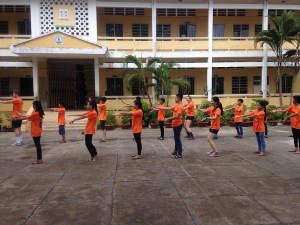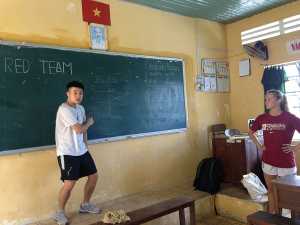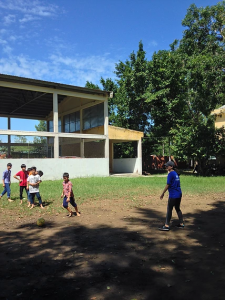
“Bong-da!”
It’s soccer time at our little school in rural Vietnam, and the kids run outside to the field — the sounds of their rubber sandals flip flopping down the stairs. Me, Yen, Minh, Ally, and Maddy race down with them, trying to keep up with their eagerness for “bong-da.” Outside, Kevin, Tara, Sy and Sajan are already hard at work putting the orange team through a game of knockout on the basketball court. Meanwhile, out on the pavement, J.D, Hoang, and Reagan are demonstrating how to pitch to the attentive yellow team. From the dance team, led by Hoai, Mackenize, and Haley, the Latin rhythms of the Macarena blare through a Bluetooth speaker and into the ears of the footloose red team.
Down near the “bong-da” field, Seth, our Coach for College coordinator, is cutting the grass with his newly purchased machete. As for us, we’re a little bit late it seems; the kids were having trouble with conjugations towards the end of English class. With a quick “xin chao” to the smiling faces of the green team, we begin our bong-da lesson. The focus will be on dribbling today, and we have the kids dribble through the cones in a relay style race — their bare feet ignoring the muddy field and murky puddles. Before we can continue onto shooting, however, an impromptu flash storm begins to pour down on us, transforming our soccer field into a tropical swamp.
Muddy balls and cones in hand, all of us run back inside the dry sanctuary of the classrooms with the sweet smell of sweat, DEET, and chalk wafting over us. It’s back to conjugating irregular verbs until the storm passes over. But no matter; as I raise a piece of chalk to the class, beckoning any brave soul to try his or her hand at “to be,” a couple of students shyly raise their hands. Bong-da can clearly wait. Until then it’s conjugation for the green team.
At first glance, this scene may seem like it was edited out of one of those cheesy Peace Corps newsreels from the Kennedy era. Yet here we are, very much in 2017; ten Duke and Stanford student athletes — three fencers, two divers, a runner, a squash player, a football linebacker, a lacrosse player, and a rower — teaching academics and sports to schoolchildren in rural Vietnam with our wonderful Vietnamese peers. As student athletes, we’ve been taught by our professors, coaches, and peers the importance of “knowledge in the service of society” within our collegiate education. Yet beyond such an impersonal, textbook definition, we’ve seldom considered what it actually means to experience “service.” Perhaps even as collective group, we’ve even at times dismissed the vast world beyond Duke and Stanford, satisfied to content ourselves within the confines our respective university’s athletics and academics.
Yet, our little school in rural Vietnam, thousands of miles away from Palo Alto and Durham (both the city and Emily, our ACE coordinator), is teaching us skills we would have never even considered relevant as Duke and Stanford students. From pantomiming verbs in front of my English class to learning how to do hand laundry, the learning curve has been steep for all of us.
- Shout out to my teammate J.D for rocking the Cupid Shuffle with the orange team!
- An English lesson in progress
- The kids can be shy at times…
- Yen, our Vietnamese “bong-da” coach putting the kids through drills
How do you teach a group of rural school kids that it’s okay to lose on competition day, as long as you have fun? How do you teach them to set long-term goals, like higher education? How do you teach them all of this without a full grasp of the Vietnamese language? What do we know about the challenges these kids are facing? We’re just privileged American student athletes!
Our ACE cohort still hasn’t exactly smoothed out all the kinks within our lesson plans, and we may never truly achieve the level of service that we strive for in our nightly lesson planning. Yet service is more than just those smiley Instagram pictures we love to post during our evening breaks in the comfort of an air conditioned hotel near the school. It’s an experience lined with sweat, frustration, and doubt — a feeling that we may never reach the kids beyond a surface level “hello” or selfie (our phenotypes very much in contrast with the students minus Sajan and me).
But most of all, it’s something that beyond such cynicism compels you to try your best, to leave something with the kids, during your short three and a half weeks here with the ACE program. It’s the feeling that certain things — like dancing the Cupid Shuffle together in the school courtyard or coming back to win the the last sports challenge on competition day — truly transcends cultural boundaries despite the many linguistic and socioeconomic differences between us and our students. Lesson three in our life skills textbook is all about attitude, and I suppose if anything, maintaining a positive attitude remains paramount for us during our next two and a half weeks here, despite the many challenges ahead.




